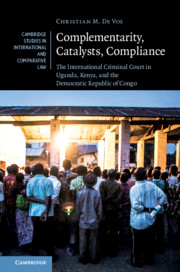 Complementarity, Catalysts, Compliance
Complementarity, Catalysts, Compliance Complementarity as a Catalyst
from Part I - The ICC and Complementarity: Evolutions, Interpretations and Implementation
Published online by Cambridge University Press: 16 April 2020
This chapter examines how complementarity has evolved from a legal rule of admissibility - an organizing principle for the regulation of concurrent jurisdiction - to an instrument of policy. This policy, often referred to as ‘positive complementarity’, is one that promotes the International Criminal Court (ICC) and the ‘Rome Statute System’ as proactive agents for domestic accountability. Drawing on constructivist international relations literature, the chapter traces this more ambitious articulation of the ICC’s relationship to national jurisdictions and argues that its ascendance reflects the work of norm entrepreneurs and transnational civil society networks who, through a duty-based reading of the Statute, have progressively sought to articulate a more catalytic vision for the court and, with it, a broad array of policy goals. At the same time, this duty-based interpretation has contributed to an increasingly disciplinary approach to implementation, one that privileges a mirroring of the Rome Statute’s content and the ICC’s form. Complementarity’s evolution is thus testament to the significant influence of non-state actors at both the transnational and local level, and of a growing effort on their part to route the entrenchment of domestic human rights through the framework and standards of international criminal law.
To save this book to your Kindle, first ensure no-reply@cambridge.org is added to your Approved Personal Document E-mail List under your Personal Document Settings on the Manage Your Content and Devices page of your Amazon account. Then enter the ‘name’ part of your Kindle email address below. Find out more about saving to your Kindle.
Note you can select to save to either the @free.kindle.com or @kindle.com variations. ‘@free.kindle.com’ emails are free but can only be saved to your device when it is connected to wi-fi. ‘@kindle.com’ emails can be delivered even when you are not connected to wi-fi, but note that service fees apply.
Find out more about the Kindle Personal Document Service.
To save content items to your account, please confirm that you agree to abide by our usage policies. If this is the first time you use this feature, you will be asked to authorise Cambridge Core to connect with your account. Find out more about saving content to Dropbox.
To save content items to your account, please confirm that you agree to abide by our usage policies. If this is the first time you use this feature, you will be asked to authorise Cambridge Core to connect with your account. Find out more about saving content to Google Drive.